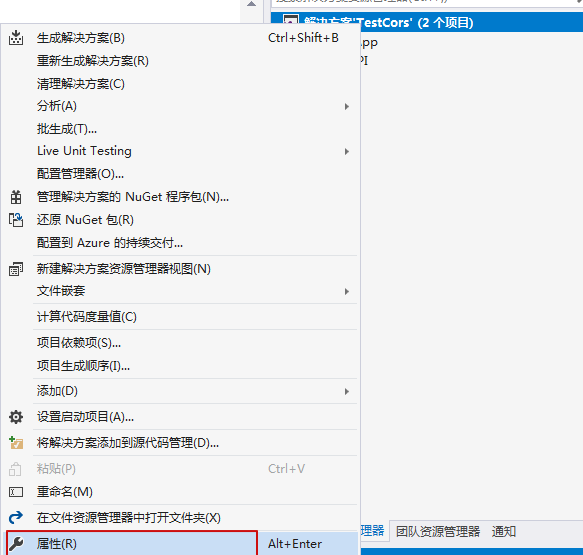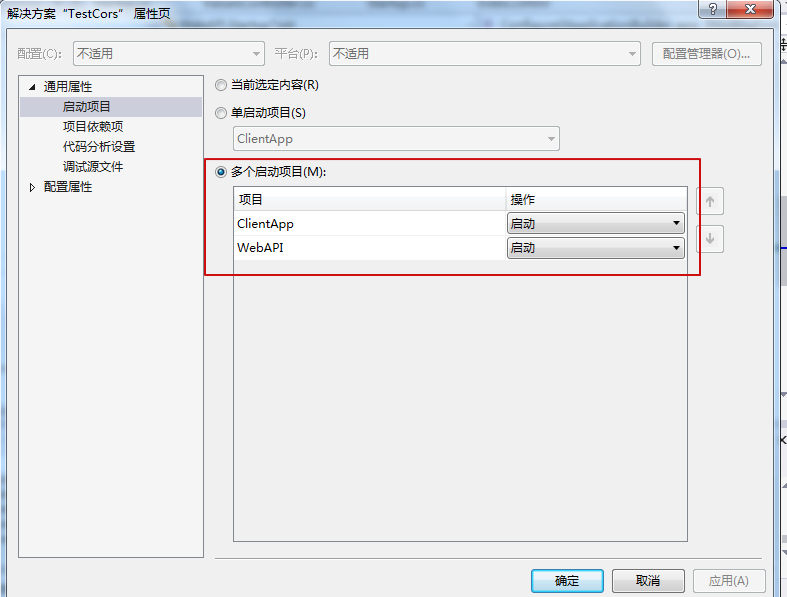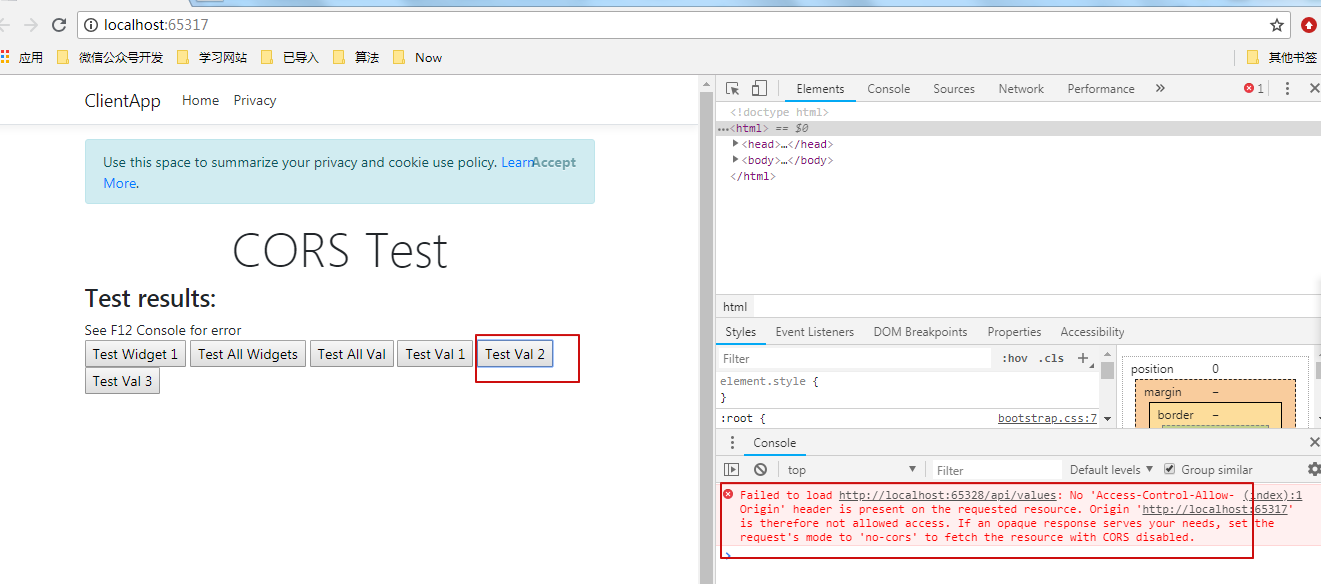asp.net core 系列之允许跨域访问2之测试跨域(Enable Cross-Origin Requests:CORS)
这一节主要讲如何测试跨域问题
你可以直接在官网下载示例代码,也可以自己写,我这里直接使用官网样例进行演示
样例代码下载:
一.提供服务方,这里使用的是API
1.创建一个API项目。或者直接下载样例代码
2.像之前讲的那样设置允许CORS,例如:
public void Configure(IApplicationBuilder app, IHostingEnvironment env) { if (env.IsDevelopment()) { app.UseDeveloperExceptionPage(); } else { app.UseHsts(); } // Shows UseCors with CorsPolicyBuilder. app.UseCors(builder => { builder.WithOrigins("http://example.com", "http://www.contoso.com", "https://localhost:44375", "https://localhost:5001"); }); app.UseHttpsRedirection(); app.UseMvc(); }
使用的时候,注意 WithOrigins("https://localhost:<port>"); 这个地址替换为客户端地址(即调用方:这里指部分Razor代码)
二.客户端,这里指调用方(页面中js调用),这里指Razor部分的代码
1.创建一个web 应用(Razor pages 或者 mvc )。样例用的Razor Pages 。
2.在index.cshtml中增加如下代码
@page @model IndexModel @{ ViewData["Title"] = "Home page"; } <div class="text-center"> <h1 class="display-4">CORS Test</h1> </div> <div> <input type="button" value="Test" onclick="requestVal('https://<web app>.azurewebsites.net/api/values')" /> <span id='result'></span> </div> <script> function requestVal(uri) { const resultSpan = document.getElementById('result'); fetch(uri) .then(response => response.json()) .then(data => resultSpan.innerText = data) .catch(error => resultSpan.innerText = 'See F12 Console for error'); } </script>
这里再多说一下,我的操作流程
首先,下载样例代码;
然后,在同一个解决方案中,导入Cors样例代码,如图

然后,可以先把解决方案设置为多个启动项目,启动,看下ClientApp的URL和WebAPI的URL


得到,我的url 分别如下:
ClientApp http://localhost:65317/ WebApi http://localhost:65328/
先停止运行,分别设置api的withOrigin和client页面中的地址,代码如下:
WebAPI中的 StartupTest (这个跟Program使用的StartUp文件有关,样例代码中使用的StartUpTest)
// Shows UseCors with CorsPolicyBuilder. app.UseCors(builder => { builder.WithOrigins("http://example.com", "http://www.contoso.com", "https://localhost:44375", "http://localhost:65317"); });
ClientApp中的Index.cshtml文件代码如下:
@page @model IndexModel @{ ViewData["Title"] = "Home page"; } <div class="text-center"> <h1 class="display-4">CORS Test</h1> </div> <div> <h3>Test results:</h3> <span id='result'></span> </div> <div> <input type="button" value="Test Widget 1" onclick="requestVal('https://webapi123.azurewebsites.net/api/widget/1')" /> <input type="button" value="Test All Widgets" onclick="requestJson('https://webapi123.azurewebsites.net/api/widget')" /> <input type="button" value="Test All Val" onclick="requestJson('https://webapi123.azurewebsites.net/api/values')" /> <input type="button" value="Test Val 1" onclick="requestVal2('https://webapi123.azurewebsites.net/api/values/1')" /> <input type="button" value="Test Val 2" onclick="requestVal2('http://localhost:65328/api/values')" /> <input type="button" value="Test Val 3" onclick="requestJson('http://localhost:65328/api/values')" /> </div> <script> function requestJson(uri) { const resultSpan = document.getElementById('result'); fetch(uri) .then(response => response.json()) .then(data => resultSpan.innerText = data) .catch(error => resultSpan.innerText = 'See F12 Console for error'); } </script> <script> function requestVal2(uri) { const resultSpan = document.getElementById('result'); fetch(uri) .then(response => response.text()) .then(data => resultSpan.innerText = data) .catch(error => resultSpan.innerText = 'See F12 Console for error'); } </script>
再运行,测试
发现当WebApi中的 WithOrigins 设置正确时,不会报跨域问题,
否则,报跨域问题。
跨域错误截图

如有疑问,可以参考网址:
https://docs.microsoft.com/en-us/aspnet/core/security/cors?view=aspnetcore-2.2#cors-policy-options





【推荐】国内首个AI IDE,深度理解中文开发场景,立即下载体验Trae
【推荐】编程新体验,更懂你的AI,立即体验豆包MarsCode编程助手
【推荐】抖音旗下AI助手豆包,你的智能百科全书,全免费不限次数
【推荐】轻量又高性能的 SSH 工具 IShell:AI 加持,快人一步
· AI与.NET技术实操系列:向量存储与相似性搜索在 .NET 中的实现
· 基于Microsoft.Extensions.AI核心库实现RAG应用
· Linux系列:如何用heaptrack跟踪.NET程序的非托管内存泄露
· 开发者必知的日志记录最佳实践
· SQL Server 2025 AI相关能力初探
· winform 绘制太阳,地球,月球 运作规律
· 震惊!C++程序真的从main开始吗?99%的程序员都答错了
· AI与.NET技术实操系列(五):向量存储与相似性搜索在 .NET 中的实现
· 超详细:普通电脑也行Windows部署deepseek R1训练数据并当服务器共享给他人
· 【硬核科普】Trae如何「偷看」你的代码?零基础破解AI编程运行原理